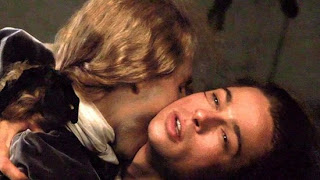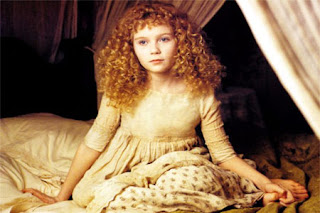 |
| "Doth he besmirch our honor, bro?" |
Interview With the Vampire: The Vampire Chronicles is, essentially, the 200-year life story of Louis (Brad Pitt), as told to a reporter (Christian Slater) in --- you guessed it --- an interview. In colonial New Orleans, Louis was a plantation owner who was mourning his late wife and child. He had lost his taste for living, and spent his time tempting death; as it turns out, he got more than he bargained for. Thanks to his deliciously suicidal tendencies and hunky good looks, Louis attracted the attention of the vampire Lestat (Tom Cruise).
 |
| Hickeys hurt so good |
 |
| Adorable + Horrifying = Adorrifying? |
Perhaps the most impressive parts of Interview With the Vampire are the productions aspects. The sets are pretty awesome throughout, peaking with Armand's ridiculously Gothic underground catacombs. The soundtrack is pretty good, although occasionally over-dramatic; in a movie that has so many emotional bromances, though, that can be expected. The costumes are also excellent period pieces, although the hair and make-up for the vampires was hit-and-miss for me. I liked that the paleness of the vampires would depend on how recently they fed, and I thought Brad Pitt's vampire eyes were pretty cool-looking. However, I couldn't get past some of the crappy wigs and Lee Press-On Nails used by some of the cast.
 |
| "Available in Natural or Glamor lengths!" |
Production values don't make a movie, though. Since this is, essentially, a vampire biopic, it needs a compelling lead and a solid story arc. I enjoyed Brad Pitt's performance as the eternally morose Louis, but his character was not really one of action; everything he did was a reaction, which makes him less interesting than some of the other characters.
 |
| Louis, in action |
It's too bad that Tom Cruise isn't very good here. I normally don't have a problem with Tom Cruise's acting, but this just felt like a poor match. He wasn't scary when he was being evil and his wicked laughter felt forced. He improved dramatically after Claudia plays her trick on Lestat, but it was a little late for that improvement to matter much. Kirsten Dunst was actually pretty good as the spoiled vampire child, which shocked me, since she's generally pretty awful. I thought Christian Slater was fine in his small part, too, although it wasn't too demanding. Antonio Banderas was less impressive as the mysterious Armand; he might have been mediocre if his wig wasn't ridiculous, or if his character's scenes weren't almost entirely devoted to subtext. Stephen Rea was a little more fun as Santiago, but he should have been more terrifying. You also might recognize Thandie Newton as Louis' main house slave; she wasn't particularly impressive, but she wasn't bad, either.
As cool as some parts of Interview With the Vampire are, they just don't add up to an entertaining or horrifying whole. I felt that director Neil Jordan focused too much on the look of this picture (which is admittedly great) and not nearly enough on the main actors. Brad Pitt can play tortured in his sleep, but I thought he wasn't given enough to do in this movie. Tom Cruise, on the other hand, had a much wider range of emotions to play with, but never came close to meeting all the demands of his character.
 |
| Tom Cruise emotes |
Maybe my problem lies with the source material. I remember reading the first few volumes of Anne Rice's Vampire Chronicles when I was younger, and I enjoyed the first couple of books (of which, Interview... was the first). After a while, though, I realized just how annoying most of her characters are. Take this story, for instance. You have a wicked vampire (Lestat), a Goth-inspired depressed vamp (Louis), a bratty child (Claudia), a maybe kind of manipulative or maybe just bored blood-sucker (Armand), and another wicked vampire without a back-story (Santiago). Who am I supposed to give a rat's ass about? By default, it becomes Louis, but he is far from an entertaining storyteller. Even what makes him initially special (his refusal to kill humans) is eventually brushed aside with barely a comment when he finally gives in to his nature.
 |
| Why so serious? |
For all the technical prowess Interview With the Vampire: The Vampire Chronicles has to offer, it's lacking in drama and interesting characters. That's not a deal-breaker for an entertaining film, but this movie isn't much fun to watch and isn't gruesome enough to scare. If you're a fan of Gothic horror, this might be up your alley. I'm not, so this one definitely earns a "meh" rating from me.






